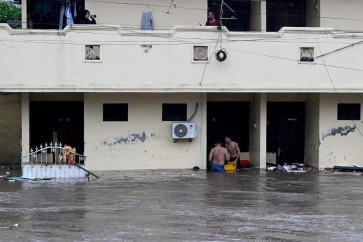Popular Reads
Top Results
Can't find what you're looking for?
View all search resultsPopular Reads
Top Results
Can't find what you're looking for?
View all search resultsJakartans compete for domestic workers
It has been days since Bunda Lestari, who works for a company that supplies domestic workers, has been able to supply maids to households in Jakarta
Change text size
Gift Premium Articles
to Anyone
I
t has been days since Bunda Lestari, who works for a company that supplies domestic workers, has been able to supply maids to households in Jakarta.
Another company Nelly Asih complained that this year there had been a shortage in domestic workers.
Middle-class Jakartans are competing with people abroad to employ domestic workers from Indonesia as local agents are finding it increasingly difficult to find people willing to work as maid.
"It seems like they *domestic workers* are more interested in finding work overseas," said Nelly Lim, the owner of Nelly Asih.
"If this goes on forever, there won't be anymore domestic workers working in Indonesia," she said.
National Network for Domestic Workers Advocacy (Jala PRT) director, Lita Anggraini, said that domestic workers were opting to work overseas rather than locally as they received higher pay and experienced roughly the same risks from a lack of protection working as domestic workers at home.
The average pay for Indonesian domestic workers abroad is higher than their salary at home, which hovers as low as Rp 300,000 to more than Rp 1 million per month (around US$29 to $100). Indonesian domestic workers in Singapore are paid S$350 (around US$243), 800 riyals (around $213) in Saudi Arabia and around 300 to 500 ringgit (around $85 to $140) in Malaysia.
Despite the high demand for domestic workers and widespread use here, Indonesia does not view the job as a profession as it is not recognized under Indonesia's labor law. As some workers live with their employers, the job remains the private business of a family, outside of the sphere of labor laws and public scrutiny.
Like reports of abuse from countries, such as Malaysia and Saudia Arabia, which have yet to regulate protection for domestic migrant workers, abuse against domestic workers at home also occurs.
"It's basically bigger pay with the same risks," Nelly said of domestic work abroad.
The UN's International Labor Organization (ILO) estimated in 2003 that 2.5 million people worked as domestic workers, while Jala PRT estimated in 2008 that more than 4 million people were employed as domestic workers, including one million child maids.
Meanwhile, of the 4.5 million Indonesians working overseas, 70 percent are women working within the households of their employers. According to the National Authority for the Placement and Protection of Indonesia Overseas Workers (BNP2TKI), 70,000 new workers are sent overseas every month.
Nelly, who has been an agent in Tangerang for 32 years, said that in areas such as Sukabumi in West Java and cities in Lampung, Sumatra's southernmost province that is usually filled with domestic workers, were now experiencing a shortage of workers.
"It's embarrassing for me to always tell my clients that we have no domestic workers," she said.
She said that she mostly hired women aged 17 or older and that her company was previously able to provide more than 20 domestic workers per month. "Now it's less than that," she said.
From the outset it seems like national policy in education and child protection has lowered the number of women interested in working as domestic workers.
Nelly said that over the last three years some families had refused to send their daughters to work and had kept them in school instead.
Nelly said that some young women worked as domestic workers for six months to save money for higher education.
Child protection law and free schooling from the government for children up to the junior high school level has stopped parents in villages from sending their young daughters to work in the city as maids.
Lita however, said that these women did not necessarily end up with formal jobs.
"This only temporarily prevents them from being domestic workers. In the end, some will be end up as domestic workers, however, not in Indonesia," she said.
The recent spat between Malaysia and Indonesia over migrant worker protection, in which the latter stopped sending domestic workers to Malaysia, did not positively affect the number of people available to work in Jakarta.
"The companies send them elsewhere, like Hong Kong or Saudi Arabia," Nelly said.
With the high demand of domestic workers in the country having to compete with demand from abroad, Lita said that this could push for an increase in domestic worker salaries in the country.
"If the demand here is higher than the supply, the salary could increase," she said. However, she did not speculate on the amount of any potential increase.










